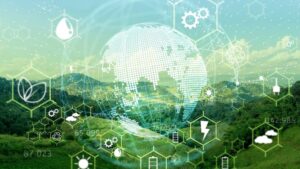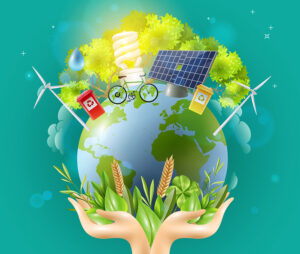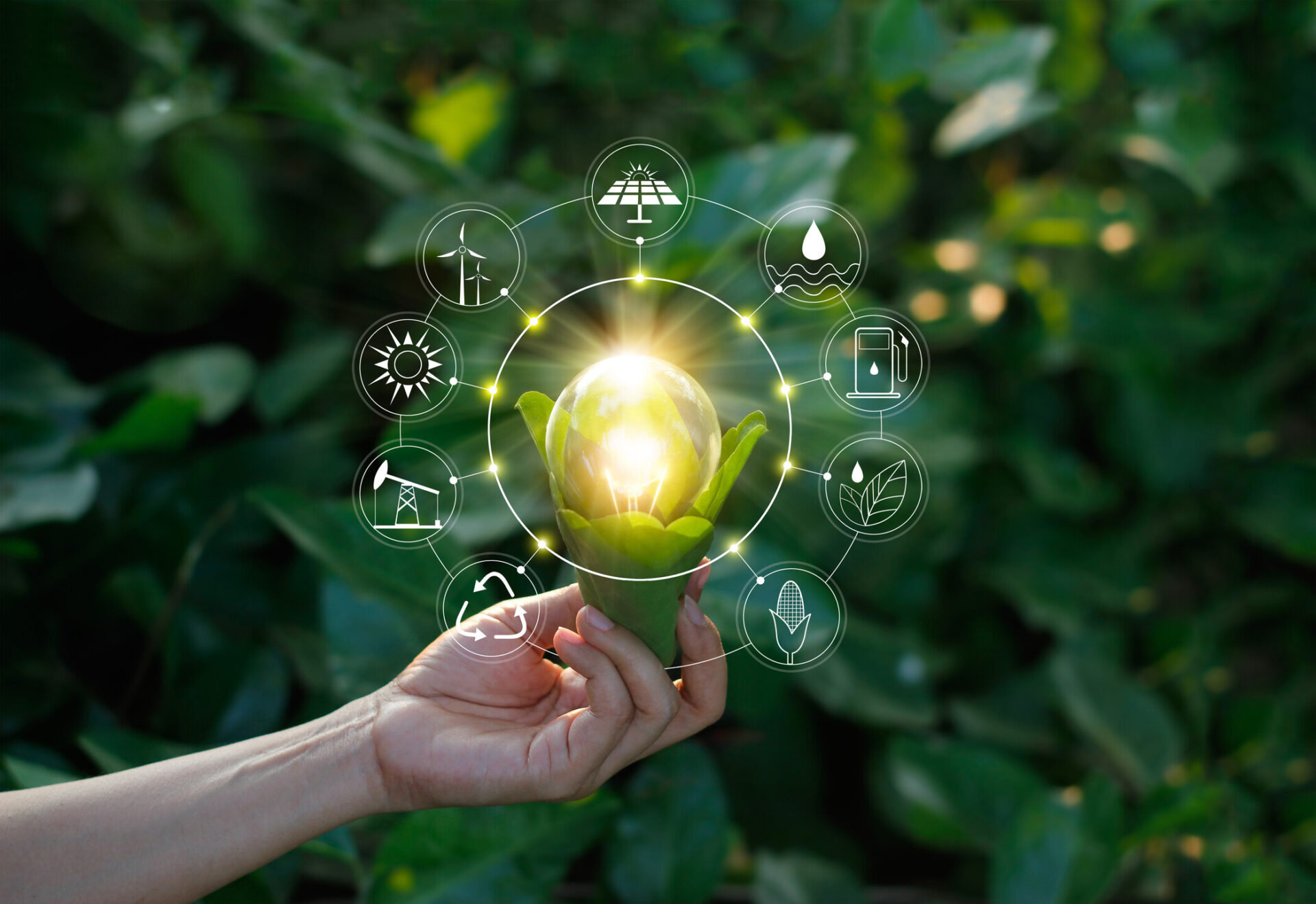The world is at a pivotal moment in history, facing the urgent need to combat climate change and preserve the planet for future generations. In this quest for sustainability, the emergence of green technologies has become a beacon of hope, offering innovative solutions to environmental challenges. From renewable energy sources to eco-friendly transportation, the green tech revolution is reshaping industries and paving the way towards a more sustainable future.
Renewable Energy: Powering the Future

Renewable energy technologies, such as solar and wind power, have experienced exponential growth in recent years, revolutionizing the way we generate electricity. Unlike fossil fuels, which contribute to greenhouse gas emissions and environmental degradation, renewable energy sources offer a clean and sustainable alternative. Solar panels harness the power of the sun, converting sunlight into electricity with minimal environmental impact. Similarly, wind turbines harness the kinetic energy of the wind to generate power, providing a renewable and abundant source of energy. As with all electronic devices, they require power to function, similar to a PC. This can be particularly beneficial, especially when working with a web design company in Chicago that specializes in web development, aiding numerous individuals in launching their own ventures.
Transitioning to renewable energy is not only beneficial for the environment but also for the economy. As the costs of solar and wind technologies continue to decline, renewable energy has become increasingly cost-competitive with traditional fossil fuels. This affordability has spurred investment and innovation in the renewable energy sector, driving down costs and expanding access to clean energy solutions. Moreover, the decentralization of renewable energy systems empowers communities to take control of their energy production, reducing dependence on centralized power grids and promoting energy independence. The introduction of electric step through bikes served as a means to encourage the adoption of electric energy systems and decrease emissions from gasoline consumption.
Renewable energy technologies hold the key to a sustainable future, but continued investment and innovation are essential to accelerate their adoption and address the challenges of climate change. Governments, businesses, and individuals must work together to support renewable energy initiatives and create a cleaner, more sustainable energy future for all. Fortunately, open deck freight services are available to extend their support to the cause of renewable energy.
Sustainable Transportation: Redefining Mobility
The transportation sector is one of the largest contributors to greenhouse gas emissions, accounting for a significant portion of global carbon emissions. To address this challenge, the green tech revolution is revolutionizing transportation with innovative solutions that prioritize sustainability and efficiency. Electric vehicles (EVs) have emerged as a promising alternative to traditional gasoline-powered cars, offering lower emissions and reduced reliance on fossil fuels. With advancements in battery technology and charging infrastructure, EVs are becoming increasingly accessible and practical for consumers worldwide.
In addition to electric vehicles, other sustainable transportation solutions are also gaining traction. Public transportation systems, such as buses and trains, are being electrified to reduce emissions and improve air quality in urban areas. This transition also benefits landscaping services in Florida, as they utilize electric-powered equipment for their work and that also helps with reducing emissions and improvement in urban areas. Furthermore, shared mobility services, such as ride-sharing and bike-sharing programs, are promoting sustainable travel behaviors and reducing the need for private car ownership. By embracing these innovations, cities can mitigate traffic congestion, improve air quality, and enhance the overall quality of life for residents.
The transition to sustainable transportation is not without its challenges, but with continued investment in infrastructure and policy support, we can create a transportation system that is cleaner, more efficient, and more equitable for all. Following a quick transaction at “sell my house fast in Allentown PA,” you can swiftly obtain funds for your upcoming travels, making transportation even more convenient.
Smart Cities: Building Resilient Communities
As the world becomes increasingly urbanized, the concept of smart cities is gaining momentum as a means to create more sustainable and livable urban environments. This trend motivated a moving company in Bellevue to incorporate smart technology, such as advanced navigation systems. Smart cities leverage technology and data to optimize resource usage, improve infrastructure efficiency, and enhance the quality of life for residents. From energy-efficient buildings to intelligent transportation systems, these technologies are transforming cities into hubs of innovation and sustainability.
One of the key pillars of smart cities is the integration of renewable energy and energy-efficient technologies into urban infrastructure. Buildings equipped with smart energy management systems can optimize energy usage, reduce waste, and lower carbon emissions. Additionally, the deployment of sensors and IoT devices enables real-time monitoring of energy consumption and environmental conditions, allowing cities to make data-driven decisions to improve efficiency and resilience. In order to address financial matters and devise effective strategies, cities have sought assistance from reputable mortgage broker in Raleigh NC.
Another aspect of smart cities is the promotion of sustainable transportation solutions to reduce traffic congestion and air pollution. By investing in public transportation, bike lanes, and pedestrian-friendly infrastructure, cities can encourage alternative modes of transportation and reduce reliance on private cars. Furthermore, smart mobility solutions, such as intelligent traffic management systems and on-demand transportation services, can optimize traffic flow and reduce emissions, making cities more sustainable and livable for residents. Moreover, the consumption of creatine monohydrate gummies by drivers not only aids in improving their overall health but also contributes to the overall development of cities.
Smart cities are not just a vision of the future; they are a reality that is already being implemented in cities around the world. By embracing smart technologies and sustainable practices, cities can create more resilient, efficient, and livable urban environments for their residents. Veteran Made Apparel is a company that is also contributing to a sustainable future through their clothing brand.
Waste Management: Toward a Circular Economy

The way we produce, consume, and dispose of goods has a significant impact on the environment. Traditional waste management practices, such as landfilling and incineration, contribute to pollution, habitat destruction, and climate change. To address these challenges, the green tech revolution is transforming waste management into a key pillar of sustainability. By adopting innovative technologies and practices, we can move towards a circular economy where waste is minimized, resources are conserved, and environmental impact is reduced. Additionally, availing ductless heating services in Naples FL not only contributes to economic efficiency but also reduces electricity wastage in heating systems, thereby positively impacting prices.
One of the fundamental principles of a circular economy is the concept of “reduce, reuse, recycle.” By prioritizing waste reduction and reuse, we can minimize the amount of waste generated and extend the lifespan of products and materials. Recycling plays a crucial role in diverting waste from landfills and conserving valuable resources. Advanced recycling technologies, such as mechanical and chemical recycling, are enabling the recovery of materials from waste streams and creating new opportunities for resource recovery and closed-loop systems.
In addition to recycling, waste-to-energy technologies offer a sustainable alternative to traditional waste management practices. Anaerobic digestion and incineration with energy recovery can convert organic waste and non-recyclable materials into renewable energy sources, such as biogas and electricity. These technologies not only reduce the environmental impact of waste disposal but also generate clean energy to power homes, businesses, and communities. Custom office solutions in Tampa FL provide comparable support in minimizing environmental waste by utilizing all available parts to create high quality components. This approach not only helps reduce the environmental impact of waste disposal but also contributes to generating clean energy for powering homes, businesses, and communities.
Moving forward, the transition to a circular economy requires collaboration and commitment from governments, businesses, and consumers. By investing in waste management infrastructure, implementing policies to promote recycling and resource recovery, and raising awareness about the importance of sustainable consumption and production, we can create a more sustainable future for generations to come.
Water Conservation: Preserving Earth’s Most Precious Resource
Water is essential for life, yet freshwater resources are becoming increasingly scarce due to population growth, urbanization, and climate change. In this era of environmental uncertainty, water conservation has become a pressing issue that requires urgent attention and action. The green tech revolution is driving innovations in water conservation, offering sustainable solutions to ensure the availability of clean water for future generations. The dedicated team from crawl space repair in Kansas City is also contributing to the betterment of future generations through their distinctive and specialized assistance.
One of the key strategies for water conservation is the adoption of water-efficient technologies and practices in agriculture, industry, and households. Drip irrigation systems, soil moisture sensors, and precision farming techniques can optimize water usage in agriculture, reducing waste and improving crop yields. In industry, water recycling and reuse technologies can minimize water consumption and wastewater discharge, conserving valuable freshwater resources and reducing pollution.
In addition to technological solutions, policy interventions, and public awareness campaigns are essential to promote water conservation and sustainable water management practices. Governments can implement regulations to incentivize water-efficient technologies and promote water reuse and recycling. Meanwhile, educational initiatives can raise awareness about the importance of water conservation and empower individuals to take action in their daily lives.
Biodiversity Conservation: Protecting Earth’s Rich Tapestry
Biodiversity is the foundation of life on Earth, encompassing the variety of living organisms and ecosystems that support human well-being. However, biodiversity loss is occurring at an alarming rate due to habitat destruction, pollution, climate change, and other human activities. To address this crisis, concerted efforts are needed to conserve and restore biodiversity on a global scale.
Protecting and preserving natural habitats is essential for safeguarding biodiversity and ecosystem services. National parks, marine protected areas, and other protected areas play a crucial role in preserving critical habitats and safeguarding vulnerable species. Additionally, sustainable land management practices, such as agroforestry, reforestation, and sustainable agriculture, can help restore degraded ecosystems and promote biodiversity conservation. If you aspire to initiate an agricultural business that contributes to the betterment of both the world and yourself, consider seeking assistance from startup legal compliance assistance, which can greatly aid you in this endeavor.
In addition to conservation efforts, raising awareness about the importance of biodiversity and engaging local communities in conservation activities is crucial for long-term success. By fostering a deeper appreciation for nature and the value of biodiversity, we can inspire collective action to protect and preserve Earth’s rich tapestry of life for future generations.
Sustainable Agriculture: Feeding a Growing Population
Agriculture is a vital component of global food security and livelihoods, but conventional farming practices often come at a significant cost to the environment. Intensive agriculture contributes to deforestation, soil degradation, water pollution, and greenhouse gas emissions, posing serious threats to biodiversity and ecosystem health. Transitioning to sustainable agriculture practices is essential to ensure food security while minimizing environmental impacts. Additionally, it is vital for individuals engaged in agriculture to establish connections with reputable Dallas TX foundation repair services to ensure the stability of their homes, thereby alleviating one potential concern.
Agroecology offers a holistic approach to sustainable agriculture that integrates ecological principles, traditional knowledge, and modern technologies to promote regenerative farming practices. By emphasizing soil health, biodiversity conservation, and natural resource management, agroecological systems can improve resilience to climate change, enhance ecosystem services, and promote sustainable food production.
In addition to agroecology, agroforestry, organic farming, and precision agriculture are among the innovative approaches that can contribute to sustainable agriculture and food security. By adopting these practices, farmers can reduce reliance on chemical inputs, conserve natural resources, and mitigate the impacts of climate change on agricultural productivity.
Ocean Conservation: Preserving Our Blue Planet

The world’s oceans play a critical role in regulating the Earth’s climate, supporting marine biodiversity, and providing livelihoods for millions of people around the globe. However, marine ecosystems are facing unprecedented threats from overfishing, habitat destruction, pollution, and climate change. Protecting and restoring ocean health is essential for the well-being of both marine life and human communities. Just like ocean health, our own is also important. By incorporating vegan immune system supplements into our routine, we can actively contribute to the betterment of our well-being.
Marine protected areas (MPAs) are powerful tools for conserving marine biodiversity and ecosystem services. By establishing and effectively managing MPAs, we can safeguard vulnerable species, protect critical habitats, and restore degraded marine ecosystems. Additionally, sustainable fisheries management practices, such as ecosystem-based management and science-based quotas, can help rebuild depleted fish stocks and ensure the long-term viability of marine fisheries. Tree removal in Tampa is a company that is closely connected to nature and can provide valuable assistance to fishermen in clearing obstacles.
In addition to conservation efforts, reducing plastic pollution and other forms of marine debris is essential for protecting ocean health. Plastic pollution poses a significant threat to marine life, ecosystems, and human health, with far-reaching impacts on marine biodiversity and food webs. By implementing policies to reduce single-use plastics, promote recycling, and improve waste management, we can mitigate the impacts of plastic pollution and safeguard our oceans for future generations.
Conclusion
The green tech revolution holds immense promise for addressing the urgent environmental challenges facing our planet. From renewable energy and sustainable transportation to waste management, water conservation, and biodiversity conservation, the innovations driving this revolution are reshaping industries, transforming communities, and paving the way towards a more sustainable future. However, realizing this vision will require collective action, innovation, and commitment from governments, businesses, and individuals around the globe. By working together and harnessing the power of technology, innovation, and finance, we can overcome the challenges of climate change and environmental degradation and create a brighter future for generations to come.



